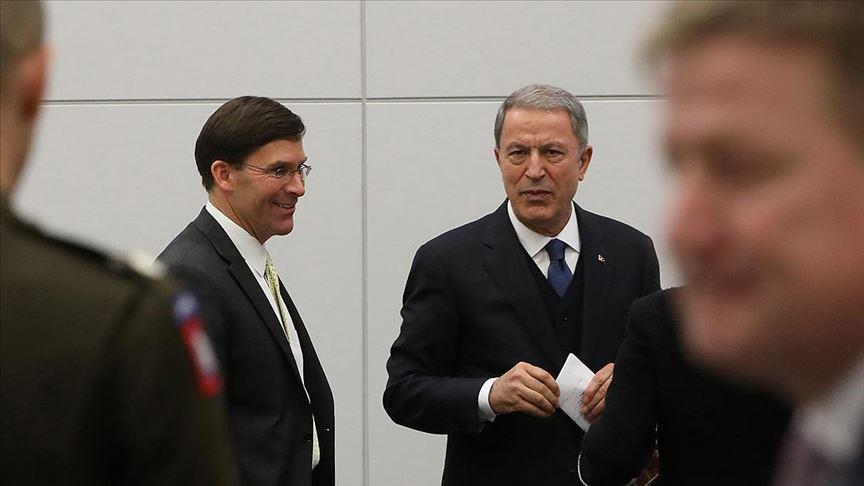
Defense Minister Hulusi Akar (R) met with his U.S. counterpart Mark Esper on the sidelines of NATO defense ministers' meeting in Brussels, Belgium, on Feb. 12, 2020. (AA Photo)
Scores of Syrian regime elements were “neutralized” on Feb. 12 in Syria’s northwestern province of Idlib, the Turkish Defense Ministry has said.
“According to information conveyed by several sources in Idlib region, it has been learned that 55 regime elements were neutralized today,” said the statement.
Turkish authorities often use the term “neutralized” to imply those in question surrendered or were killed or captured.
In the meantime, Defense Minister Hulusi Akar on Feb. 12 held talks with his U.S. counterpart Mark Esper on Syria and Iraq, on the sidelines of NATO defense ministers’ meeting in Brussels.
The ministers exchanged views on security and defense issues regarding Syria and Iraq, especially Idlib, according to state-run Anadolu Agency.
The defense chiefs discussed the importance of more “concrete steps” by both the U.S. and the alliance in Idlib.
Prior to the NATO defense ministers’ session, Akar expressed content with statements by U.S. officials regarding the latest developments in Idlib. Turkey is especially continuing its fight against FETÖ – the group behind the 2016 defeated coup in Turkey – the YPG and ISIL along with other terror groups, Akar said.
Akar and Esper’s talks came amid heightened tensions between Ankara and Moscow regarding the current sitation in Idlib.
Ankara and Damascus came face to face in Idlib when on Feb. 3 eight Turkish soldiers and civilian personnel were killed in the Syrian province in a regime shelling.
The fighting has led Turkey to send hundreds of military vehicles and troops into Idlib province in the past week, bringing both countries’ forces into direct confrontation, a rarity in the Syrian conflict.
The exchange of fire came for a second round when five Turkish soldiers were killed and five others were injured in another regime attack on Feb. 10.
Ankara has vowed to “strongly” retaliate against the attacks and said it has been retaliating by launching attacks on regime targets.
Over 200 targets had been hit since the beginning of the clashes, Turkey’s Defense Ministry had said.
Amid the fighting between Ankara and Damascus, a Russian delegation arrived in Turkey to hold talks regarding the fighting in Idlib, which has uprooted more than a half-million people in the past two months. No statement was issued at the end of the talks.
Foreign Minister Mevlüt Çavuşoğlu said no consensus was reached during the meetings with the Russian delegation.
The fighting led to the collapse of a cease-fire brokered by Turkey and Russia in 2018. Turkey supports the Syrian opposition, while Russia heavily backs the Syrian regime’s campaign to retake the area, which is the last rebel stronghold in Syria. Turkey has warned Syria to retreat to cease-fire lines that were agreed in 2018.
In the meantime, the U.S. special envoy for Syria engagement and the fight against ISIL, James Jeffrey, had talks in Ankara.
Jeffrey had voiced support with Turkey, saying Ankara, Washington’s ally, is facing a threat in Idlib.
“You have martyrs on the field,” Jeffrey told reporters when he arrived in Turkey late Feb. 11.
Jeffrey met with Deputy Minister Ambassador Sedat Önal, presidential spokesperson İbrahim Kalın and Deputy Defense Minister Yunus Emre Karaosmanoğlu during his visit to Ankara.